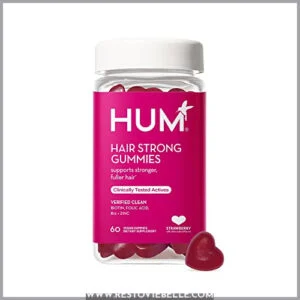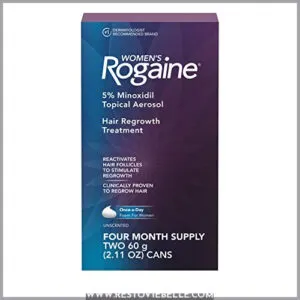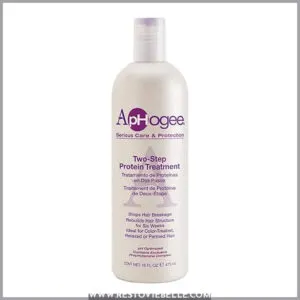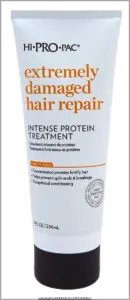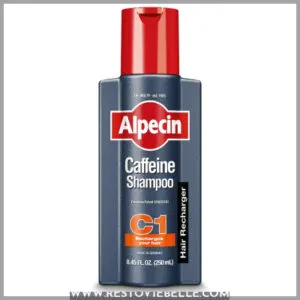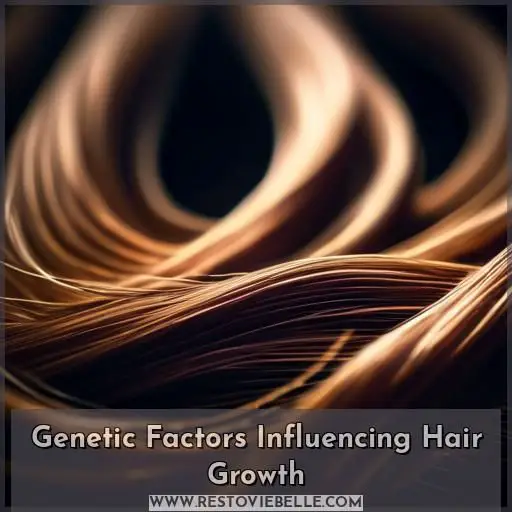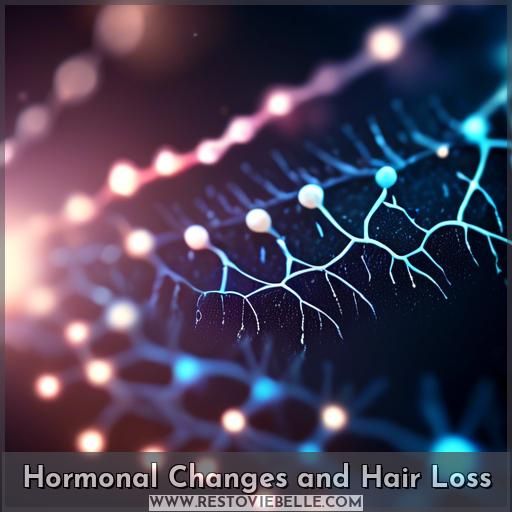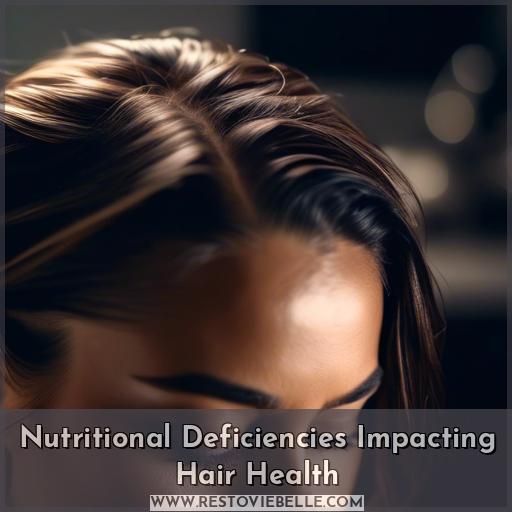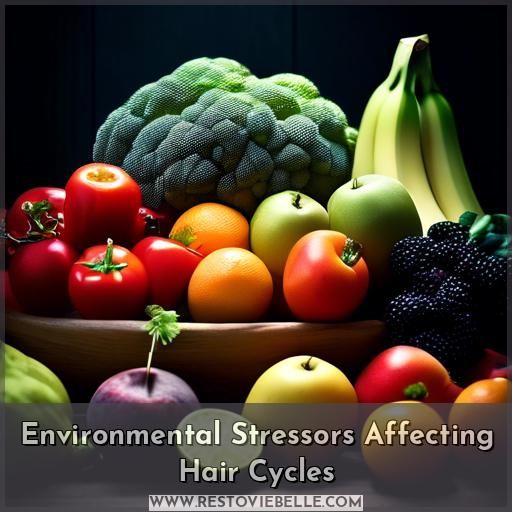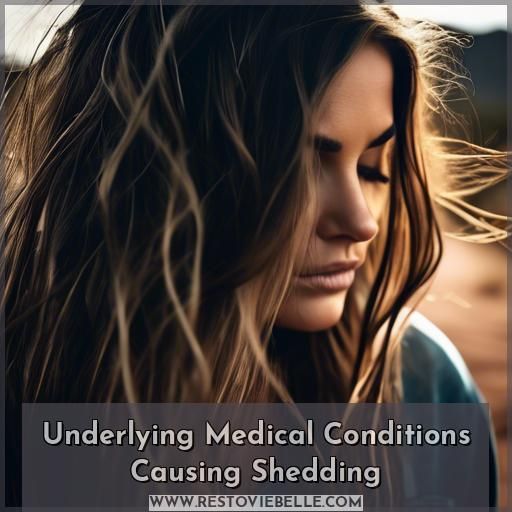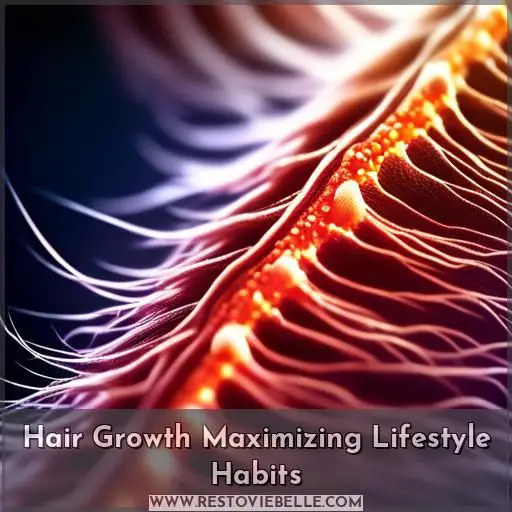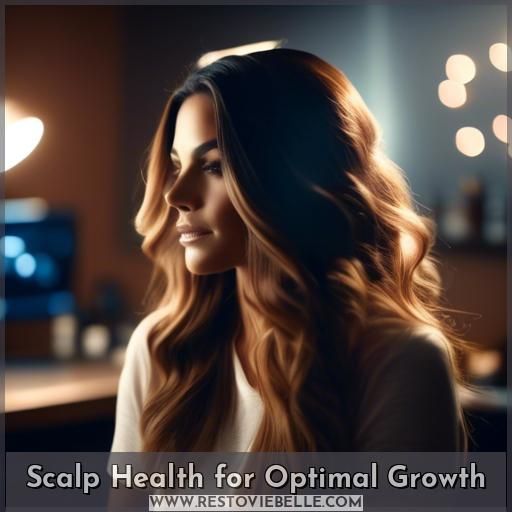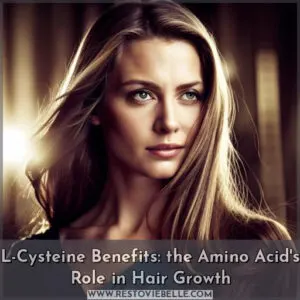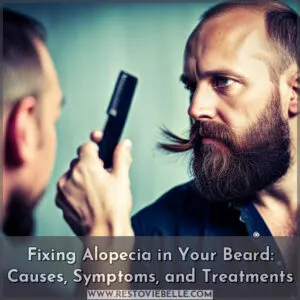This site is supported by our readers. We may earn a commission, at no cost to you, if you purchase through links.
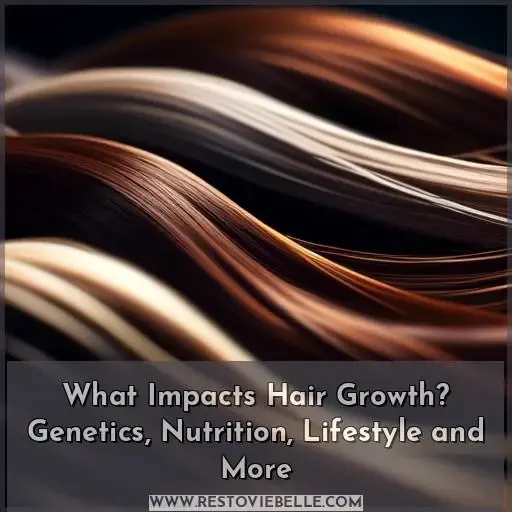
Your hair’s growth is notably influenced by genetics, which establish scalp characteristics such as sebum production, follicle density, and hormonal sensitivity.
Nutritional shortages, particularly in proteins, vitamins, and omega fatty acids, can hinder growth.
Hormonal imbalances caused by factors such as menopause, thyroid problems, and stress also affect hair cycles.
External stressors such as oxidative stress, heat styling, and chemical treatments harm follicles.
To optimize growth, follow a balanced diet, manage stress, and prioritize scalp health.
Exploring further uncovers underlying medical conditions and lifestyle habits that influence hair’s health.
Table Of Contents
- Key Takeaways
- What Impacts Hair Growth?
- Top 7 Hair Growth Products
- 1. Nutrafol Women’s Hair Growth Supplements
- 2. Hair Growth Gummies with Biotin
- 3. Pure Carrier Oils Essential Oils DIY Set
- 4. Rogaine Women’s 5 Percent Minoxidil Foam
- 5. Aphogee Two-step Protein Treatment for Damaged Hair
- 6. Extremely Damaged Hair Repair Treatment
- 7. Alpecin C1 Caffeine Hair Growth Shampoo
- Genetic Factors Influencing Hair Growth
- Hormonal Changes and Hair Loss
- Nutritional Deficiencies Impacting Hair Health
- Environmental Stressors Affecting Hair Cycles
- Underlying Medical Conditions Causing Shedding
- Hair Growth Maximizing Lifestyle Habits
- Scalp Health for Optimal Growth
- Frequently Asked Questions (FAQs)
- What are the most common genetic factors that contribute to hair loss?
- How does stress affect hair growth?
- What are the most effective hair care products for promoting hair growth?
- How does hormonal imbalance impact hair health and growth?
- What are the most effective dietary changes to support healthy hair growth?
- Conclusion
Key Takeaways
- Genetics play a significant role in hair growth, as they dictate the growth rate and hair type.
- Age and sex influence hair growth, with hair growing fastest between the ages of 15 and 30 and slowing with age.
- External factors, such as stress, season, and scalp health, can also impact hair growth.
- Hair growth is influenced by various factors, including genetics, age, sex, and health.
What Impacts Hair Growth?
Hair growth is influenced by various factors, including genetics, age, sex, and health. The average hair growth rate is about 0.5-1.7 cm per month, but this can vary widely among individuals. Male hair tends to grow faster than female hair, and natural, textured hair tends to grow slower than other hair types. External factors, such as stress, season, and scalp health, can also impact hair growth.
Genetics play a significant role in hair growth, as they dictate the growth rate and hair type. Age and sex also influence hair growth, with hair growing fastest between the ages of 15 and 30 and slower with age. Health conditions, such as alopecia areata or scalp infections, can cause hair loss, and medications like minoxidil and finasteride are often prescribed to treat hair loss.
Hair growth is also impacted by the hair follicle shape, which determines hair texture. The hair growth cycle consists of three phases: anagen (growth), catagen (resting), and telogen (shedding). Hair follicles on the scalp can become inactive, leading to hair loss, and individuals may shed 50-100 hairs daily.
Top 7 Hair Growth Products
You’re taking the right approach by considering hair growth products to address thinning or shedding concerns.
A combination of supplements, topicals, and treatments can effectively target various factors impacting hair growth. This includes nutritional deficiencies, hormonal imbalances, damage repair, and scalp issues.
When selecting products, look for evidence-based formulas containing clinically proven ingredients. These ingredients may include minoxidil, biotin, essential oils, proteins, and caffeine.
1. Nutrafol Women’s Hair Growth Supplements

As you navigate the complex world of hair growth, Nutrafol Women’s Hair Growth Supplements emerge as a beacon of hope.
Imagine equipping your follicles with a tiny army of 21 vitamins, minerals, and natural ingredients, all marching in unison towards the common goal of luscious locks.
This physician-formulated battalion is clinically proven to wage war on thinning hair, with 90% of women witnessing a hair transformation in just 6 months.
Pop those four capsules daily with a meal, and you might just find yourself flipping thicker, stronger hair in no time.
Sure, the price tag might make your wallet wince, but can you really put a price on a crowning glory that turns heads?
Best For: Women ages 18-44 looking to improve hair growth and thickness
- Clinically proven to improve hair growth and reduce shedding
- Formulated with 21 vitamins, minerals, and natural ingredients
- Physician-developed
- Expensive
- May take up to 90 days to see results
- Large pills (4 per day)
2. Hair Growth Gummies with Biotin
Biotin gummies are a sought-after hair growth supplement that contains biotin, a B vitamin that’s integral for hair, skin, and nail health. These gummies are designed to bolster wholesome hair growth by delivering the requisite nutrients for keratin and collagen production, which are vital for preserving the robustness and composition of hair. Biotin gummies are frequently composed with other vitamins and minerals, such as vitamins A, B-5, C, E, and folic acid, to amplify their potency in invigorating hair growth and diminishing hair loss.
Biotin gummies are typically facile to consume, as they come in a gummy form that’s both delectable and practical. Multifarious users chronicle perceptible results within a few weeks to a month, with some experiencing notable enhancements in hair thickness, plentitude, and overall well-being. These gummies are also vegan, gluten-free, and non-GMO, making them amenable for an expansive ambit of nutritional predilections and limitations.
It is paramount to recognize that while biotin gummies can bolster wholesome hair growth, they shouldn’t be regarded as a panacea for hair loss or a replacement for appropriate scalp care and overall health. It’s essential to preserve a balanced diet, manage stress, and eschew harsh hair treatments to promote optimal hair growth. Additionally, if you’re encountering hair loss, it’s essential to consult a healthcare professional to determine the underlying cause and formulate an appropriate treatment plan.
Best For: Individuals seeking to support healthy hair growth, skin, and nails.
- Easy to take and delicious
- Noticeable results in as little as a month
- Strengthens nails and improves overall hair health
- Packaging and price could be improved
- Texture and flavor may vary depending on the batch
3. Pure Carrier Oils Essential Oils DIY Set
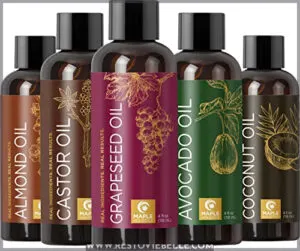
To utilize the Pure Carrier Oils Essential Oils DIY Set for hair growth, adhere to the following steps:
- Select a carrier oil from the set that aligns with your hair type. For instance, if you possess fine hair, contemplate employing grapeseed oil, which can augment volume and thickness to your hair. If you have dry hair, sweet almond oil is a prudent choice as it enhances the strength and brilliance of your hair and combats environmental stressors.
- If you desire to incorporate essential oils into your carrier oil, make a selection from the roster of superior essential oils for hair growth, such as rosemary essential oil, which has been demonstrated to promote hair thickening and growth by suppressing DHT, a hormone that thins hair.
- Intermix the essential oils with the carrier oil in a 1-3% dilution for topical application. For example, if you utilize 30ml of carrier oil, you should incorporate 18 drops of essential oils into the blend, resulting in a 2% dilution.
- Concoct the essential oils in the bowl or jar, stirring assiduously until they’re thoroughly combined, then add the carrier oil and continue to stir.
- Store and utilize: Your essential oil hair blend is now prepared for use. Transfer the mixture to the dropper bottle (you may find it more convenient to use a funnel). Secure the cap and store in a cool, dry space devoid of direct sunlight or heat.
- To apply the oil to your hair, administer some of the mixture to your hands and gently massage it in, allowing it to rest for 30-60 minutes.
Bear in mind to conduct a patch test prior to use to ascertain that you don’t experience an allergic reaction or irritation to the oils. Conformably adhere to methods that align with your hair type and refrain from utilizing heavy oils excessively if you have fine hair, as they can weigh it down.
Best For: Those seeking a set of pure carrier oils for DIY hair and skincare creations.
- Variety of carrier oils for different hair and skin types
- Oils are pure and cold-pressed
- Oils absorb well and have no odors
- Oils are in one plastic bag
- Bottles were a little oily
- Castor oil is thicker than the other oils
4. Rogaine Women’s 5 Percent Minoxidil Foam
Rogaine Women’s 5% Minoxidil Foam is a topical hair regrowth treatment designed for women experiencing hair loss or thinning. The foam contains minoxidil, a medication that’s clinically proven to regrow hair and has FDA approval for use in both males and females with hair loss or hair thinning. The foam is formulated with 5% minoxidil, botanical extracts, emollient, and AHA, which work together to reactivate the natural hair growth cycle and promote the growth of fuller, thicker hair.
To use Rogaine Women’s 5% Minoxidil Foam, apply half of a capful of foam to the scalp once a day, focusing on areas where hair is thinning. Gently massage the foam into the scalp, allowing it to absorb and air dry completely before blow-drying or styling your hair. It’s recommended to use the foam every day for best results, and users may begin to see results in 3-6 months.
The foam is unscented and easy to apply, making it a convenient option for those looking to address hair loss and thinning. It’s also safe to use on color-treated or chemically treated hair, but should be applied first and allowed to dry before using other hair products.
It is essential to follow the recommended usage instructions and consult with a healthcare professional before using Rogaine Women’s 5% Minoxidil Foam, as it may cause side effects such as irritation, dry skin, and temporary hair loss.
Best For: Women experiencing hair loss or thinning.
- Clinically proven to regrow hair
- Easy to apply, no-mess foam
- Conditions the scalp to prevent irritation and dryness
- May cause side effects such as irritation, dry skin, and temporary hair loss
- Requires daily use for best results
- May take several months to see results
5. Aphogee Two-step Protein Treatment for Damaged Hair
Aphogee’s Two-Step Protein Treatment is a powerful and effective solution for repairing damaged hair. Formulated with activated proteins and magnesium, this treatment fuses into the hair with the application of heat, drastically reducing breakage for 4-6 weeks. It’s recommended for hair that’s too weak or fine to take a perm, over-bleached, won’t hold color, breaks when combed or brushed, mushy when wet and brittle after drying, or has lost its curl pattern due to chemical over-processing.
To use the treatment, gently cleanse your hair with ApHogee Shampoo for Damaged Hair, rinse thoroughly, and towel blot dry. Apply enough ApHogee Two-Step Protein Treatment to thoroughly saturate your hair and comb blend for even distribution. Leave your hair uncovered, without using a plastic cap, and seat it under medium heat dryer. Alternatively, you can use a hand dryer, but don’t agitate the hair while drying. After rinsing thoroughly with warm water, re-wet and gently rinse again. Apply ApHogee Balancing Moisturizer to restore shine and luster to your hair.
For best results, it’s recommended to use the treatment once every 4-6 weeks. It’s also important to note that when the treatment is dried into the hair, the hair becomes extremely hard, so don’t comb or brush your hair while it’s dried and in the hair.
Best For: Chemically treated, damaged, or over-processed hair.
- Repairs damaged hair structure within six weeks
- Prevents hair breakage
- Cruelty-free
- Requires follow-up with moisturizing conditioner
- Can be messy to apply
- May cause hair to feel dry and brittle if overused
6. Extremely Damaged Hair Repair Treatment
If your hair is severely damaged and in need of repair, consider trying an extremely damaged hair repair treatment like the Hi-Pro-Pac cream.
This product is designed to treat even the most damaged hair, leaving it feeling soft, silky, and smelling good in just 2-5 minutes.
Crafted from concentrated proteins and active moisturizers, it’s a great choice for those with dry, frizzy, or curly hair.
It’s also reasonably priced and helps with hair loss and thinning hair.
However, it may not work as well for very coily hair.
Best For: Those with severely damaged hair looking for a quick and effective repair treatment.
- Treats even the most damaged hair
- Results in just 2-5 minutes
- Leaves hair feeling soft, silky, and smelling good
- May not work as well for very coily hair
- Not specified if it is safe for color-treated hair
- May not be effective for all types of hair damage
7. Alpecin C1 Caffeine Hair Growth Shampoo
Alpecin C1 Caffeine Shampoo is a sought-after hair growth product that’s formulated with a proprietary Caffeine Complex containing caffeine, zinc, and niacin. These ingredients are renowned for aiding in strengthening and enhancing the appearance of hair, and they’ve been shown to contribute to natural hair growth. The shampoo is designed to purify the scalp, which is fundamental for hair growth and retention. It’s appropriate for all men with thinning hair and is clinically proven to be effective.
The Caffeine Complex in Alpecin C1 Caffeine Shampoo aids in maintaining natural hair growth by providing the hair with the necessary energy and nutrients to grow healthily. Caffeine can counteract the detrimental effects of testosterone on hair growth, balancing out the resulting lack of energy and prolonging the growth phases of hair roots. The shampoo is infused with caffeine, which stimulates and energizes hair daily, resulting in stronger, fuller-looking hair.
To use Alpecin C1 Caffeine Shampoo, massage it into wet hair and scalp, leave it on for two minutes, and then rinse thoroughly. It’s recommended to use the shampoo daily for optimal results, and if hair requires less washing, the After Shampoo Liquid Scalp Tonic can be used in between shampoos.
Best For: Men with thinning hair looking to improve hair growth
- Strengthens and enhances the appearance of hair
- Clinically proven to be effective
- Pleasant manly smell
- Expensive
- Inconvenient dispensing method
- Can be used with conditioner
Genetic Factors Influencing Hair Growth
Your genetic makeup notably shapes hair growth and quality. Genetic factors govern scalp characteristics such as sebum production, hair follicle density and dimensions, the percentage of hair follicles in active growth stages, and hormonal susceptibility – all of which affect hair growth patterns.
Scalp Health and Hair Growth
Scalp health is essential for hair growth and retention. Malassezia, a scalp microbiome component, contributes to oxidative damage, which negatively impacts hair health. Oxidative stress, prevalent in scalp conditions like dandruff, seborrheic dermatitis, psoriasis, and atopic dermatitis, can lead to lipid peroxidation and damage to hair follicles. Psoriasis links oxidative stress, Malassezia spp., and hair loss risk. Scalp aging is also influenced by oxidative stress, which triggers senescence in hair follicle stem cells and contributes to androgenetic alopecia.
To maintain scalp health and promote hair growth, it’s imperative to manage dandruff, seborrheic dermatitis, and other scalp conditions. Products with Malassezia control agents can help reduce premature hair loss. Shampoos and scalp care products can improve hair cosmetically and address scalp conditions. Zinc pyrithione (ZPT)-based shampoos have been shown to increase hair counts and reduce hair loss.
Genetic factors, hormonal changes, autoimmune disorders, medications, and medical conditions can also influence hair growth and loss. Maintaining a healthy diet, managing stress levels, and avoiding harsh hair treatments can help prevent hair loss. Consulting a dermatologist for early diagnosis and treatment is vital for addressing hair loss issues.
Oxidative Stress and Hair Loss
Oxidative stress, a common factor in scalp pathologies, can negatively impact hair health.
Malassezia, a component of the scalp microbiome, contributes to oxidative damage.
Lipid peroxidation, a method to detect oxidative stress in dermatology, is linked to hair aging and follicle senescence.
Psoriasis, an inflammatory skin condition, is associated with oxidative stress and hair loss risk.
Treatment options for hereditary pattern baldness, such as minoxidil or finasteride, can help manage oxidative stress.
Hair growth supplements, like those containing biotin or zinc pyrithione, can also support healthy hair growth by reducing premature hair loss.
Scalp Care and Hair Growth
After diving into the deep end of oxidative stress and its hair-raising effects, let’s swim over to the oasis of scalp care.
Think of your scalp as a garden; without proper tending, weeds (like Malassezia) thrive, and flowers (your hair) wilt.
Using the right tools—medications, hair products designed to combat lipid peroxidation, and nurturing practices—can turn a barren landscape into a lush mane.
Hormonal Changes and Hair Loss
Hormonal changes can have a substantial impact on hair growth and hair loss.
During menopause, estrogen levels decline, which can lead to hair thinning, reduced volume, dry and brittle strands, and texture alterations.
Birth control pills can also affect hair growth, with some formulations stimulating hair growth while others may cause hair loss.
Thyroid function is another hormonal factor that can influence hair growth, as thyroid hormones play a pivotal role in hair follicle development and maintenance.
Stress can also impact hair growth, as elevated levels of stress hormones like cortisol can affect hair follicle function and regulation.
Nutritional Deficiencies Impacting Hair Health
Nutritional deficiencies can markedly affect hair health and growth. Proteins, essential vitamins and minerals, and omega fatty acids fulfill pivotal roles in preserving the structural integrity of hair strands, stimulating follicle regeneration, and upholding scalp health.
Role of Proteins
Just as hormonal shifts can leave your locks longing for better days, skimping on protein intake is like sending your hair follicles on a fruitless quest for growth.
These tiny factories crave amino acids to churn out keratin, the hero protein that gives your hair shaft its strength.
Without enough, your mane’s growth rate could crawl slower than a snail’s pace.
Essential Vitamins and Minerals
Essential vitamins and minerals play a key role in maintaining healthy hair and preventing hair loss.
Biotin, also known as vitamin B8, is a vital component for maintaining hair function, strength, and texture. Deficiency in biotin can lead to poor nutrient metabolism, resulting in undernourished hair follicle cells and hair loss.
Iron is another essential mineral that contributes to healthy hair follicles, impacting hair growth and health. A lower intake of iron leads to poor hair growth.
Selenium deficiency is responsible for sparse hair growth and generalized hair loss.
Vitamin deficiencies can cause hair loss, thinning, brittle hair, poor hair health, and other hair-related issues.
Omega Fatty Acids
Essential fatty acids play a critical role in hair health.
They’re indispensable for cell membrane function and contribute to hair growth and stress reduction.
Omega-3 and omega-6 fatty acids, found in sources like fish, nuts, and seeds, can help prevent hair loss and enhance hair quality.
Omega supplements and hair treatments can be advantageous for those with omega deficiencies or those seeking to improve their hair growth and diet.
Environmental Stressors Affecting Hair Cycles
Environmental stressors can markedly affect hair growth by impacting the hair cycle and the well-being of hair follicles. Here are three key points to examine:
- Oxidative stress: This is a condition caused by an imbalance between the production of free radicals and the body’s capacity to neutralize them. Oxidative stress can harm hair follicles and contribute to hair loss. Malassezia, a component of the scalp microbiome, contributes to oxidative stress by producing lipid peroxides, which can lead to inflammation and damage to hair follicles.
- Lipid peroxidation: This is a process that occurs when lipids in the hair follicle are exposed to oxidative stress. It can lead to the early onset of the catagen phase in hair cycles, which is a phase of hair growth where the hair follicle shrinks and the hair is shed. This can result in premature hair loss.
- Hair aging: Oxidative stress plays a significant role in the aging of hair follicles. As hair follicles age, they become less able to produce new hair, leading to thinning and eventual hair loss. This process is influenced by genetic factors, hormonal changes, and environmental stressors.
Underlying Medical Conditions Causing Shedding
Underlying medical conditions can considerably affect hair growth and induce shedding. Protein shortage, thyroid problems, autoimmune disorders, and recovery from surgery are some of the common medical conditions that can lead to hair loss.
Protein deficiency can result in hair loss as the body tries to preserve protein by pushing hair follicles into a dormant state, resulting in hair shedding about two to three months after switching to a diet low in protein. Thyroid issues, such as hypothyroidism, can also trigger hair loss, as thyroid hormones play a critical role in hair growth and maintenance.
Autoimmune disorders, like alopecia areata, can cause sporadic hair loss, while conditions like Hashimoto’s thyroiditis and Graves’ disease may affect both the hair and other parts of the body. Recovery from surgery can lead to hair loss due to stress on the body and fluctuations in hormone levels, which can push hair follicles into their resting phase.
To address hair loss caused by these underlying medical conditions, it’s important to consult with a healthcare provider for a proper diagnosis and treatment. In some cases, medications like minoxidil or finasteride may be prescribed, while in others, lifestyle changes or dietary modifications may be necessary.
Hair Growth Maximizing Lifestyle Habits
Following a balanced diet rich in essential nutrients and maintaining low stress levels are imperative for maximizing hair growth. Thermal styling and chemical treatments can impair hair follicles, obstructing their ability to cultivate robust, healthy strands; hence, minimizing these practices is prudent for optimal hair growth.
Balanced Diet
A well-balanced diet is essential for hair growth and overall well-being.
Vital nutrients such as Omega fatty acids, adequate protein intake, and proper vitamin levels can have a substantial effect on hair health.
Including dark leafy greens, fish, nuts, legumes, and skimmed dairy in your diet can supply the necessary nutrients for healthy hair growth.
Biotin supplements can also help protect against fragile hair.
Maintaining a healthy diet is a fundamental lifestyle habit for maximized hair growth.
Stress Management
Essential for maintaining healthy hair and preventing hair loss is managing stress.
Stress can result in hormonal imbalances, inflammation, and diminished blood flow to the scalp, all of which can contribute to hair loss.
Effective stress management techniques include regular exercise, practicing meditation or mindfulness, engaging in hobbies or activities that bring joy and relaxation, ensuring a balanced diet, and getting sufficient sleep.
These practices aid in reducing cortisol levels, improving blood circulation to the scalp, and fostering overall well-being.
If you have taken steps to reduce stress and you’re still losing your hair, consider reaching out to a therapist for support and guidance.
Avoiding Heat Styling
Avoiding heat styling is another lifestyle habit that can maximize hair growth. High temperatures, mechanical damage, and chemical damage from styling tools can negatively impact hair health. Instead, embrace protective styling and consider your hair porosity when choosing styling methods. By reducing damage, you’re promoting a healthier scalp and hair follicles, which can lead to better hair growth.
Scalp Health for Optimal Growth
An unhealthy scalp environment, marked by conditions like dandruff and seborrheic dermatitis, can impair hair growth and quality. Dandruff, characterized by flaking and itching, and seborrheic dermatitis, an inflammatory skin disorder causing red, scaly patches, can disrupt the hair growth cycle and weaken the hair shaft, leading to increased shedding and compromised hair health.
Managing Dandruff
Managing dandruff is essential for maximizing hair growth.
Dandruff commonly results from Malassezia, a scalp microbiome component that contributes to oxidative damage.
Zinc pyrithione (ZPT) is an agent that controls Malassezia, commonly found in shampoos, which can minimize premature hair loss.
Psoriasis, a scalp condition associated with oxidative stress, Malassezia spp., and hair loss risk, can likewise be managed with ZPT-based shampoos.
Treating Seborrheic Dermatitis
Seborrheic dermatitis is a common scalp condition that can negatively impact hair growth and quality. It’s characterized by scaly patches, itching, and dandruff, which can lead to hair loss if left untreated. Treating seborrheic dermatitis involves a combination of home remedies and medical interventions.
Home Treatments:
- Over-the-counter (OTC) antifungal and anti-itch creams can help manage symptoms.
- Hypoallergenic soap and detergent can be used to avoid skin irritation.
- Thoroughly rinsing soap and shampoo off the scalp is essential to prevent irritation.
- Shaving off a mustache or beard can help reduce scalp irritation.
- Wearing loose cotton clothing can prevent skin irritation.
Medical Treatments:
- Prescription-strength shampoos and ointments containing hydrocortisone, fluocinolone, or desonide can be applied directly to the affected area.
- Antifungal medications may be prescribed in rare cases.
- Topical terbinafine solution, 1 percent, has been shown to be effective in treating scalp seborrhea.
- Fluocinolone acetonide, 0.01 percent in oil, can be applied to the entire scalp overnight to treat inflammation.
Scalp Care Products:
- Antifungal shampoos, such as ketoconazole shampoo, can help manage seborrheic dermatitis.
- Moisturizing shampoos can be used after medicated shampoos to prevent dessication of the hair.
- Topical corticosteroid solutions, lotions, or ointments may be used once or twice daily for one to three weeks to aid in resolution of erythema and itching.
Prevention and Management:
- Developing a good skin care routine is essential for managing seborrheic dermatitis.
- Learning to recognize and eliminate triggers, such as stress, hormonal changes, and harsh hair treatments, can help prevent flare-ups.
- Regularly shampooing with an antidandruff shampoo can help maintain scalp health and prevent hair loss.
- In some cases, oral medications, prescription shampoos, and medicinal creams or gels for the scalp and other areas of the body may be necessary for severe symptoms or long-term treatment.
Frequently Asked Questions (FAQs)
What are the most common genetic factors that contribute to hair loss?
The most significant genetic culprit? Androgenetic alopecia – that dreaded male/female pattern baldness inherited from your rogue follicle family tree. It’s like playing hereditary Russian roulette with your hairline, mate!
How does stress affect hair growth?
Stress triggers a hormonal response that shunts nutrients away from hair follicles, disrupting the growth cycle. You’ll see more hairs falling out during stressful periods as follicles prematurely enter the resting telogen phase. Managing stress is key for luscious locks!
What are the most effective hair care products for promoting hair growth?
For revving up hair growth, you can’t beat products with minoxidil or natural ingredients like biotin, saw palmetto, and pumpkin seed oil. These follicle-boosters are backed by solid science and real results.
How does hormonal imbalance impact hair health and growth?
Hormonal imbalances can seriously mess with your hair growth, babe. Too much testosterone triggers hair thinning, while an underactive thyroid slows down the whole hair cycle – causing that dull, limp look we all dread.
What are the most effective dietary changes to support healthy hair growth?
You’re skeptical about dietary impact on hair? Eat protein-rich foods like eggs, fish, and legumes – the building blocks. Load up on nutrients like biotin, iron, zinc, and vitamins to nourish follicles from within. See the difference as strands become thicker, shinier.
Conclusion
Like a tree’s roots nourishing its branches, nurturing your scalp’s environment fosters peak hair growth. You’ve explored how genetics, nutrition, hormones, and lifestyle factors intertwine to impact hair’s health. By tending to these elements through a balanced diet, stress management, and scalp care, you cultivate the ideal conditions for luscious locks to flourish.

